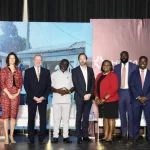Afreximbank has announced plans to launch a massive textile project in Nigeria that will generate up to 250,000 jobs and drastically transform the country’s garment industry. The announcement was made by the bank’s outgoing President and Chairman of the Board, Prof. Benedict Oramah, during the 32nd Annual Meetings of the African Export-Import Bank held on Friday.
According to Oramah, construction of the integrated textile facility will begin in July 2025. The development is part of a $5 billion partnership between Afreximbank, Arise Integrated Industrial Platforms (IIP), Swiss textile equipment manufacturer Reitter, and the Government of Switzerland.
“This will be one of the biggest textile facilities in the region,” Oramah said, describing the initiative as a bold step towards boosting Africa’s industrialisation, job creation, and trade in value-added products.
The project is expected to produce 350,000 tonnes of garments annually, helping Nigeria reduce its textile import bill by $4.7 billion and breathe new life into the country’s cotton industry, which has seen a decline in recent years.
The Nigerian facility is modeled after a similar one already developed in Benin Republic but on a significantly larger scale. Oramah said the project would not only drive textile production but also stimulate growth in related sectors such as agriculture and logistics.
The initiative is part of a broader strategy by Afreximbank to accelerate Africa’s industrialisation through the development of Special Industrial Zones. Through its platform Arise IIP—jointly owned by Afreximbank, Africa Finance Corporation (AFC), and private equity fund Equitane—the bank has already invested heavily in infrastructure projects in countries including Côte d’Ivoire, Gabon, Nigeria, Rwanda, Tanzania, Togo, Benin, and Chad, with additional projects underway in Angola, Kenya, Malawi, DRC, and Zimbabwe.
Since 2011, Afreximbank has poured approximately \$2 billion into industrial developments across Africa. In Nigeria, aside from the textile plant, a Special Agro-Industrial Zone is also under development to host agro-allied, pharmaceutical, renewable energy, and logistics businesses.
Oramah stressed that the textile initiative represents a significant milestone in Nigeria’s path to economic diversification. By cutting import dependency and empowering local industries, the project is expected to strengthen Nigeria’s position in Africa’s manufacturing landscape and create opportunities for thousands of households and small businesses tied to the garment and cotton value chain.










